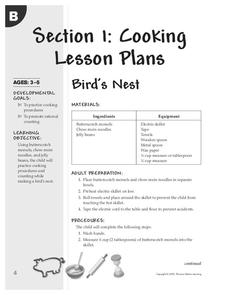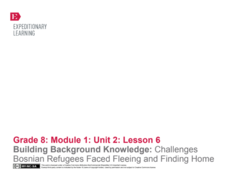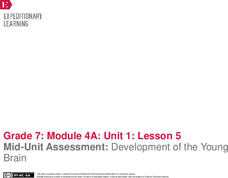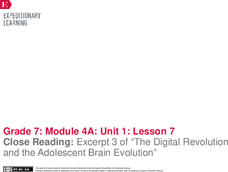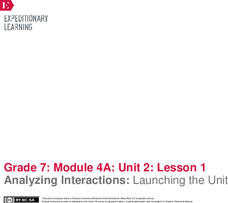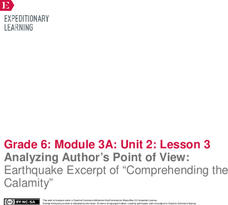Thomson Delmar Learning
Cooking Lesson Plans
Get cooking with some preschool and kindergarten-based cooking lesson plans. As young cooks follow the directions on the recipes, they practice hand-eye coordination, measurement, counting, and nutritional eating.
EngageNY
Grade 9 ELA Module 3, Unit 1, Lesson 8
Have you ever wanted to learn more about a subject after you finished a great book? Guide ninth graders through an inquiry-based research project as they finish the first chapter of Temple Grandin's Animals in Translation. Having...
EngageNY
Grade 9 ELA Module 3, Unit 1, Lesson 4
Can dogs feel shame? Explore the anthropomorphic connection between human emotions and animal behavior—or lack thereof—with a lesson about Temple Grandin's book, Animals in Translation. Ninth graders continue a close reading of chapter...
EngageNY
Grade 9 ELA Module 3, Unit 1, Lesson 3
To what extent can the surrounding environment influence one's behavior? Temple Grandin explores her connection to animals and her unique ability to understand their behavior with a lesson plan focusing on her book, Animals in...
EngageNY
Grade 9 ELA Module 2, Unit 3, Lesson 11
Who is to blame for Bernie Madoff's crime? Class members look for evidence Diana B. Henriques uses in The Wizard of Lies: Bernie Madoff and the Death of Trust to support her claims that we share the responsibility with Madoff.
EngageNY
Grade 9 ELA Module 2, Unit 3, Lesson 3
"We need forgiveness and someone to blame." True? Class members continue their analysis of the central claims in Walter Mosley's essay and the support he offers for these claims about people's fascination with crime.
Eastconn
Women of the California Gold Rush
The California Gold Rush was not just an opportunity for the male gold miners sifting for shiny nuggets. Small groups read accounts of the ways women took advantage of the influx of workers to run hotels, bake pies, and wading out into...
National Park Service
A Tale of Two Men
Theodore Roosevelt and the Marquis de Mores were both born in 1858, and both came to the Dakota territory in 1883, but they influenced the developing country of America in different ways. Elementary and middle schoolers apply written and...
Stanford University
Declaration of Independence
Scholars work in pairs to decide whether leaders wrote the Declaration of Independence for the rich and powerful or for every man. To draw their conclusion, pairs read excerpts from two historians and complete a graphic organizer citing...
EngageNY
Building Background Knowledge: Challenges Bosnian Refugees Faced Fleeing and Finding Home
What challenges did Bosnian refugees face as they fled home during the Bosnian War? Scholars read an interview with four refugees and identify common themes that connect the universal refugee experience. They also engage in a...
EngageNY
Launching A Midsummer Night’s Dream: The Universal Appeal of Shakespeare, Part 2
As scholars prepare to read Shakespeare's A Midsummer Night's Dream, they first read the article "Shakespeare's Universal Appeal Examined" and analyze its central idea. Next, pupils complete Frayer Model worksheets to understand better...
EngageNY
End of Unit 3 Assessment: On-Demand Writing— Photograph and Song Choices for a Film
Ready, set, write! Every great film begins with a script, and every presentation starts with a plan. Directors use their research and experience to compose an essay explaining the rationale behind their film's musical and visual choices...
EngageNY
Mid-Unit Assessment: Development of the Young Brain
Scholars view a video clip about adolescent brain development and work with partners to identify the main idea and supporting details. Next, as part of the mid-unit assessment, pupils watch another clip from the video and complete a main...
EngageNY
Close Reading: Excerpt 3 of “The Digital Revolution and the Adolescent Brain Evolution”
It's time to level up and discover how video games affect the brain. Pupils explore the topic as they continue reading excerpts from an article about adolescent brain development and the digital revolution. Scholars also participate in a...
EngageNY
Analyzing Interactions: Launching the Unit
How much screen time is too much? Scholars explore the question as they consider whether the American Academy of Pediatrics (AAP) should increase its screen time recommendations. With group discussions, close readings, and a jigsaw...
EngageNY
Paraphrasing and Evaluating Sources: “Gaming Can Make a Better World”
Explore how gaming might make the world a better place. To dissect the statement, scholars watch video clips about the benefits of video games. While listening, pupils make notes in their researcher's notebooks, attempting to discern the...
EngageNY
Contrasting Evidence: “Games Can Make a Better World” and “Video Games Benefit Children, Study Finds”
Anecdotes, analogies, testimonies, statistics. The most powerful arguments rely on multiple types of evidence. Scholars explore the topic as they read contrasting evidence about the benefits of video games. They complete Venn diagrams to...
EngageNY
Evaluating Sources, Continued: The ONLINE EDUCA Debate 2009 (Part 2 of 10)
Watching videos and playing online games can be educational, but too much screen time has its drawbacks. Pupils watch a video about the topic and write down the claim, reasons, and evidence in support of reduced screen time for children....
EngageNY
Paraphrasing and Evaluating Sources: Pages 112–116 of The Big Thirst
Agriculture and water—it's a fine balance. So how exactly do industry and agriculture currently manage water? Pupils consider the question as they continue reading excerpts from Charles Fishman's The Big Thirst and adding notes to their...
EngageNY
Writing: Analyzing the Conclusion of “The Golden Key” and Drafting a Compelling Conclusion for the Hero’s Journey Narrative
There's something different here. Using a note-catcher, scholars determine the differences between the conclusion of a piece of analytical writing and the conclusion of a narrative. Next, they begin drafting their own narrative...
EngageNY
Mid-Unit 3 Assessments, Part 1: Summarizing, Analyzing and Discussing Research
Speak up and listen up. Scholars participate in a speaking and listening mid-unit oral assessment. They discuss whether their rules to live by should be a personal choice or made into a law, and then they complete an exit ticket to...
Teaching Tolerance
Social Media for Social Action
Engage in activism, not slacktivism! Scholars discuss social media and the Internet as tools for social change. Next, they engage in a close reading strategy called Thinking Notes as they read an article about social media activism.
EngageNY
Analyzing Author’s Point of View: Earthquake Excerpt of “Comprehending the Calamity”
How do authors convey their points of view? Using the resource, scholars read an excerpt from a primary source document about the 1906 San Francisco earthquake. Then, they complete graphic organizers to analyze the author's point of view.
EngageNY
Narratives as Theater, Part I: What is Readers Theater?
Discover the exciting world of readers theater! Scholars learn all about the reading strategy, reading a script about American heroes and completing an I Notice/I Wonder chart. Next, pupils participate in readers theater using the script.
Other popular searches
- Informational Text Features
- Informational Text Passages
- Teaching Informational Text
- Informational Text Structure
- Writing Informational Text
- Informational Texts Unit
- Informational Text Lesson
- Comprehend Informational Text
- Summarizing Informational Text
- Using Informational Texts
- Analyzing Informational Text
- Informational Text8rating=3


